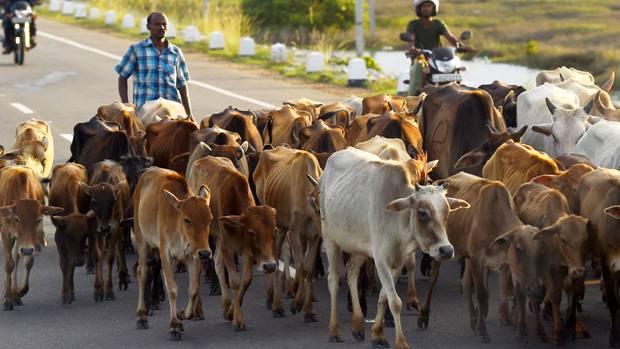Sri Lanka cattle-slaughter ban mimics India’s slight of Muslims
China-leaning Mahinda Rajapaksa seeks political gains with Modi-style policy
By Munza Mushtaq
COLOMBO – Sri Lanka’s ruling party has proposed a ban on the slaughter of cattle that the country’s Muslim minority sees as a new effort to inflame their community as Buddhist groups amass political power.
While Prime Minister Mahinda Rajapaksa’s government denies the ban is meant as a swipe against Muslims, it does call it a “good gesture” toward the Buddhist majority.
The ban also adds some geopolitical intrigue to South Asia, where Rajapaksa has a reputation of following the lead of China, Sri Lanka’s largest benefactor. But in this case, Rajapaksa appears to be taking his cue from Indian Prime Minister Narendra Modi, who has come under heavy criticism for political moves that left his country’s Muslim minority in a precarious position.
While Indian Muslims came under violent attacks, Rajapaksa’s ban on the slaughter of cattle would likely cost Sri Lankan Muslims jobs and income.
Rajapaksa has received overwhelming support from hard-core Buddhist groups and monks as well as Hindu groups that are against the consumption of meat due to religious beliefs.
Parliament’s approval of the proposed ban has been postponed until next month.
Muslims, who account for 9.7% of the country’s population, believe the ban targets them. They make up Sri Lanka’s second-largest minority group, after the Tamils, 12.6% of the population. Muslims account for much of the beef trade and are the main consumers of the meat in Sri Lanka, though a significant percentage of non-Muslims, including Buddhists, also eat beef.
Many Buddhists, though, do stay away from beef for religious and cultural reasons.
Rajapaksa’s ruling Sri Lanka Podujana Peramuna, or SLPP, last month won an absolute majority in the country’s Parliament. The victory came about nine months after Gotabaya Rajapaksa, the prime minister’s younger brother, won the nation’s presidential election.
In both elections, Buddhists, who make up to 70% of the country’s population, were instrumental.
Mujibur Rahman, a Muslim parliamentarian representing the opposition Samagi Jana Balawegaya (SJB) party, is concerned that Mahinda Rajapaksa’s ban is not about following the precepts of Buddhism. “If they are following Lord Buddha’s policy, then they must ban slaughter of all animals and not only cattle,” he said. “So, this is not about Lord Buddha’s policy. Instead, this is Mahinda Rajapaksa’s policy.”
While accusing the Rajapaksas of creating “unnecessary issues and resorting to being communal,” he warned that the policy would directly and indirectly throw many thousands connected to the trade out of work and decimate their income.
According to the Department of Animal Production and Health, Sri Lanka’s cattle population in 2019 was over 1.5 million. It also had 472,000 buffalo.
The country produced over 29,000 tons of beef that year, up 1,000 tons from 2018.
Hilmy Ahmed, vice president of the Muslim Council of Sri Lanka, an umbrella body of Muslim civil organizations, said the ban will end up increasing the cattle population, with herds roaming across many parts of the country.
“An aged cow or bull fetches approximately 35,000 Sri Lankan rupees ($189),” he said, “and most farmers sell at least 20 to 30 cattle a month. But, if the law is passed, they will have no choice but to let these bulls roam the streets.
“This can be disastrous and will impact the income of farmers.”
Since 2013, the Rajapaksa brothers have been accused of behind-the-scenes involvement with several anti-Muslim campaigns led by hard-line Buddhists. Over the years, Buddhist elements have demanded that halal certification be outlawed.
More violent elements have burned and damaged Muslim-owned businesses and homes.
Islamophobia took a sharp upturn after the deadly Easter attacks of last year that were masterminded by Muslim extremists. The attacks left more than 250 dead.
Paikiasothy Saravanamuttu, executive director of the Centre for Policy Alternatives, a Colombo-based think tank, said the slaughter ban is “definitely” intended to discriminate against Muslims.
“The SLPP’s policy is a Sinhala Buddhist majoritarian policy, and they are very much aligning themselves with what they believe what the Sinhala Buddhist majority wants to see and this move could be to satisfy the Buddhists,” he told Nikkei.
About 75% of Sri Lankans are Sinhalese, who are predominantly Buddhist.
Government spokesman Keheliya Rambukwella denied that the ban is meant to discriminate against Muslims. “This is a self-assumption, and a wrong one, because many Sri Lankans eat beef,” he told Nikkei.
Rambukwella also said requests from “various quarters” came in calling for the ban, and the proposal was mostly put forward as a “good gesture” toward the Buddhist community.
Meanwhile, the Government Medical Officers Association, a group of pro-Rajapaksa doctors, has come out in support of the ban by linking beef consumption to cancer.
Arshath Zameek, a medical professional, says there is “some degree of truth” to the claimed link but that “a better approach would have been to ban processed meat while also raising awareness of the risks of processed meat and cancer.”
-Munza Mushtaq is a senior journalist from Sri Lanka and this article was originally featured on asia.nikkei.com


